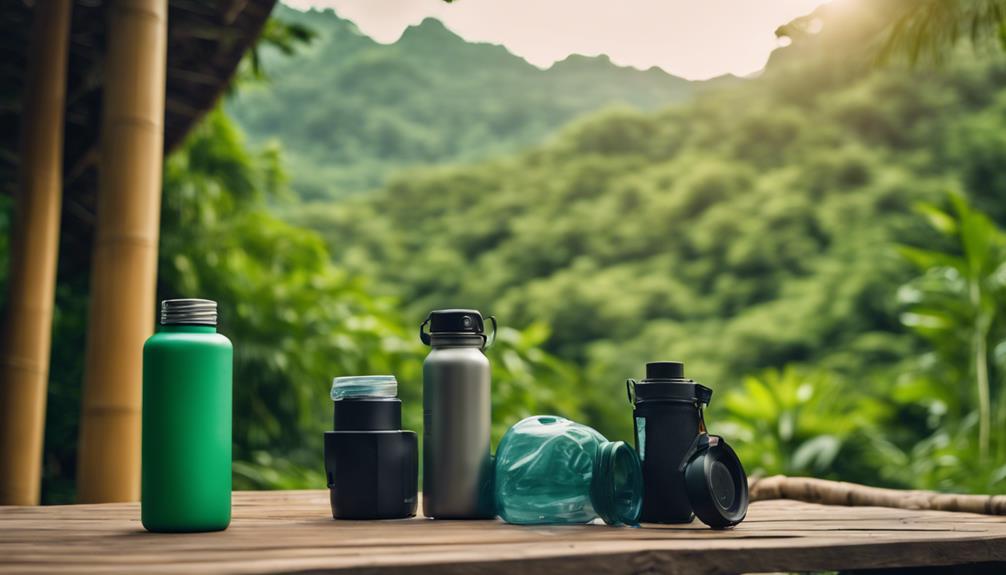As an eco-aware traveler, opt for sustainable accommodations and transportation options. Cut down on plastic, support local economies, and consider carbon offsetting initiatives. Work to conserve the environment and respect local cultures while choosing responsible tour operators. Embrace packing light and stand up for wildlife protection. Every decision you make can contribute to a healthier planet. By learning more, you can discover a wealth of ways to make your travels more environmentally friendly.
Key Takeaways
- Choose sustainable accommodations that promote energy conservation and support local economies.
- Opt for eco-friendly transportation methods, such as trains, public transport, or cycling.
- Minimize plastic use by carrying reusable items and choosing eco-friendly toiletries.
- Participate in carbon offsetting programs to reduce your travel's environmental impact.
- Support wildlife protection through ethical tourism activities and supporting conservation organizations.
Embracing Sustainable Accommodations
When planning your travel, opt for eco-friendly accommodations that hold sustainability certifications, as this supports businesses dedicated to preserving our planet. Look for lodgings that actively promote energy and water conservation, sustainable food sourcing, and diversity. These sustainable accommodations not only minimize your environmental impact but also create a more inclusive and eco-conscious travel experience.
Participate in towel and linen reuse programs during your stay. It's a small action, but it notably reduces water and energy consumption. Remember, every bit counts when it comes to sustainability.
For a more local and authentic experience, consider supporting guesthouses or homestays. You'll engage with the community, contribute to the local economy, and foster a sense of belonging. It's not just about finding a place to rest your head; it's about becoming part of a community that values sustainability and diversity.
Accommodations with energy and water efficiency measures in place are also worth considering. They've taken steps to limit their environmental impact, showing a commitment to the planet that aligns with your values. By choosing these places, you're voting with your wallet and encouraging the growth of sustainable practices within the hospitality industry.
Eco-friendly Transportation Choices
Choosing a greener mode of transport isn't just about reducing your carbon footprint; it's also a way of embracing the journey as part of your travel experience. Sustainable travel is about making eco-friendly transportation choices, ones that are friendly to our planet and reduce greenhouse gas emissions.
Consider trains, coaches, and public transport. They're more environmentally friendly than planes and cars, with trains producing 66% less CO2 emissions per passenger mile. Even when you need a car, you can opt for electric, hybrid, or smaller models when renting. These electric vehicles emit zero tailpipe emissions, translating to cleaner air and a healthier environment.
Walking or cycling can drastically reduce your carbon footprint, with walking being the pinnacle of eco-friendly travel. Many destinations offer bike-sharing programs and electric scooters, providing fun, sustainable ways to explore.
Reducing Plastic Use While Traveling
As you journey around the globe, it's important to think about how your plastic use impacts the environment.
You can make a significant difference by focusing on alternatives to single-use plastics, learning how to recycle on-the-go, and investing in reusable travel essentials.
These simple changes can help you travel more sustainably, and greatly contribute to the reduction of plastic pollution.
Alternatives to Single-Use Plastics
You can greatly reduce your contribution to the 8 million tons of plastic ending up in our oceans each year by opting for reusable alternatives like water bottles, shopping bags, and cutlery during your travels. By making this simple switch, you're not only practicing sustainable travel, but you're also playing a part in reducing plastic pollution worldwide.
Countries like Kenya and Rwanda have already banned single-use plastics, reflecting their commitment to combat environmental damage. Embracing eco-friendly alternatives is not just a trend—it's a responsibility we all share as global citizens.
Consider the following alternatives to single-use plastics:
| Single-use Plastic Item | Eco-friendly Alternative |
|---|---|
| Plastic water bottles | Reusable water bottles |
| Plastic shopping bags | Cloth or jute bags |
| Plastic cutlery | Bamboo or metal cutlery |
| Plastic straws | Metal or paper straws |
| Plastic containers | Glass or metal containers |
When you choose to reduce plastic waste, you're contributing to a healthier planet. Remember, every plastic-free choice counts in our collective effort to foster a sustainable future. So next time you pack your suitcase, don't forget your reusable items—because sustainable travel practices start with you.
Recycling On-the-Go: Tips
Traveling doesn't mean giving up on your eco-friendly habits, so let's explore some practical tips for reducing plastic use while on the go.
Next, remember to bring your reusable water bottle. It's a simple step, but it greatly reduces plastic waste. With over a million plastic bottles bought every minute globally, your choice can make a big impact.
Additionally, always have a reusable shopping bag on hand. Plastic bags can take up to a thousand years to decompose, so it's essential to avoid them whenever possible.
Choosing a reusable straw and cutlery is another way to reduce plastic usage. Given that Americans alone use 500 million straws daily, imagine the difference you can make!
Eco-friendly toiletries, another recycling on-the-go tip, are a great way to further reduce plastic waste. Considering the average person generates 4.4 pounds of trash every day, every little effort helps.
Reusable Travel Essentials
With over 8 million tons of plastic dumped into our oceans every year, it's clear that swapping single-use items for reusable travel essentials like water bottles, straws, cutlery, and shopping bags can make a significant dent in reducing waste. As eco-conscious travelers, embracing sustainable travel practices is more than a choice; it's a responsibility.
The world uses an estimated 500 billion single-use plastic bottles annually. Imagine the impact you can make by simply carrying a reusable water bottle. By saying no to single-use plastic cutlery and straws, you're not just reducing plastic waste; you're setting a precedent, inspiring others to follow suit.
Shopping bags have a notorious reputation for their plastic waste contribution. Choosing reusable bags not only reduces this waste but also curbs the 40% of plastic produced for packaging.
Your contribution doesn't stop at dining and shopping. Be mindful of your toiletries too. Opt for eco-friendly toiletries housed in reusable containers. Even your choice of sunscreen can be a step towards reducing plastic waste when you choose eco-friendly options.
Every small step counts. So, gear up, pack your reusable travel essentials, and let's journey towards a cleaner, greener planet together.
Supporting Local Economies
Embracing sustainable travel not only assists in conserving the environment, but it also plays a significant role in supporting local economies, creating jobs, and boosting income within communities. When you opt for locally owned businesses and accommodations, you guarantee that your hard-earned money stays within the destination, directly benefiting the local economy.
By supporting local artisans and purchasing their locally made products, you contribute to the economic development of the region. These unique items often reflect the culture and history of the area, offering you a tangible memory of your travels.
Similarly, engaging with local guides not only enhances your travel experience through cultural exchange, but also provides direct financial support to individuals in the community.
As an eco-conscious traveler, you have the power to influence sustainable development within the places you visit. By implementing responsible tourism practices, you help foster local growth.
Carbon Offsetting Travel Practices
Often, as an eco-conscious traveler, you can combat the inevitable carbon footprint of your journey by participating in carbon offsetting programs. These programs fundamentally calculate the carbon dioxide emissions produced by your travel activities and offer you options to offset that impact. It's the perfect way for sustainable travelers like yourself to play an active role in combating climate change.
Imagine, for instance, that your flight produces a certain amount of greenhouse gas emissions. An offset program like Atmosfair allows you to counterbalance that amount by investing in reliable renewable energy projects or reforestation initiatives. Your contribution can help fund a wind farm in India, or a reforestation project in Nicaragua. That's a tangible impact!
In this way, you're not just reducing your carbon footprint, but also promoting a greener, more sustainable world. These offset programs offer transparency and accountability, ensuring that your funds truly contribute to reducing global emissions.
By making the informed decision to offset your travel emissions, you're joining a global community of travelers committed to sustainable practices, fostering a sense of belonging and shared responsibility in our fight against climate change.
Respecting Local Cultures
As an eco-conscious traveler, you should always make an effort to learn and respect the local customs and traditions of the places you visit. This isn't just about being polite – it's about showing appreciation for cultural diversity and minimizing the negative impacts of tourism on local traditions.
Engage with locals in a respectful manner. This interaction allows for meaningful connections and mutual cultural exchanges. You'll find that it enriches your journey and provides you with unique insights that aren't found in travel guides.
Support local artisans whenever possible. This enables you to contribute to the preservation of traditional crafts and practices while also taking home a piece of the culture.
Opt to choose locally sourced products and services. This way, you directly benefit the community and promote sustainable tourism.
Lastly, participate in cultural experiences with an open mind and heart. This will allow you to fully immerse in the local way of life, making your travels more authentic and memorable.
| Ways to Respect Local Cultures | Why It Matters | How It Benefits You |
|---|---|---|
| Learn and respect local customs | Preserves local traditions | Enriches travel experience |
| Engage with locals | Promotes cultural exchanges | Provides unique insights |
| Support local artisans | Helps preserve traditional crafts | Authentic souvenirs |
| Choose locally sourced products | Benefits the local community | Promotes sustainable tourism |
| Participate in cultural experiences | Allows immersion in local culture | Makes travel more authentic |
Environmental Conservation on Vacation
As you progress on your journey towards sustainable travel, it's essential to contemplate your environmental conservation efforts while on vacation.
Think about how you can minimize your carbon footprint, interact responsibly with wildlife, and make eco-friendly accommodation choices.
These small but significant actions can allow you to enjoy your travels while also preserving the natural world for future generations.
Minimizing Carbon Footprint
When planning your vacation, you can greatly reduce your carbon footprint by adopting a few sustainable travel practices. The carbon emissions produced during travel can be overwhelming, but there are effective ways to minimize them.
Firstly, choose direct flights whenever possible. This simple decision can reduce the carbon emissions of your travel by up to 50%, as direct flights emit fewer greenhouse gases than connecting flights.
Secondly, pack light. The lighter your luggage, the less fuel is consumed during your journey. It's a small change that can make a big difference.
Opt for sustainable transportation options such as trains or buses once you've reached your destination. These alternatives emit fewer greenhouse gases than cars, making your exploration of new places more eco-friendly.
At your accommodation, be mindful to conserve water and energy as much as possible. This not only minimizes your carbon footprint but also encourages sustainable practices in the tourism industry.
Responsible Wildlife Interaction
Exploring the domain of responsible wildlife interaction, it's essential you choose ethical wildlife experiences that put the welfare of animals and conservation efforts first. Shun activities causing harm, like riding elephants or interacting with captive beasts. Instead, show support for wildlife conservation by visiting sanctuaries and wildlife rehabilitation centers. These places prioritize animal welfare and provide you with responsible wildlife tourism opportunities.
| Avoid Harmful Activities | Support Conservation | Observe Responsibly |
|---|---|---|
| Elephant riding | Wildlife sanctuaries | Keep safe distance |
| Captive animal interaction | Wildlife rehabilitation centers | Don't feed animals |
| Hunting | Participate in conservation programs | Stay on marked trails |
| Buying products made from endangered species | Donate to conservation efforts | Respect natural habitats |
| Disturbing nesting sites | Educate others on responsible wildlife tourism | Leave no trace |
Eco-Friendly Accommodation Choices
To make your vacation more eco-friendly, start by choosing accommodations with sustainability certifications, as this actively supports environmental conservation efforts. Use our sustainable travel tips to guide your selection: look for lodgings that prioritize energy and water conservation practices, sustainable food sourcing, and uphold a commitment to diversity.
There's power in the little things. Participate in towel and linen reuse programs at your chosen eco-friendly accommodation. It's a simple way to conserve resources and reduce waste during your stay.
Energy efficiency should be a big part of your decision. Choose sustainable accommodations that employ energy and water efficiency measures. This not only reduces your environmental impact, but also contributes to conservation efforts.
Consider supporting local guesthouses or homestays that prioritize sustainability. By doing so, you're helping to sustain local economies and communities, while also minimizing your carbon footprint.
Being eco-conscious doesn't mean compromising comfort or quality. With careful planning and thoughtful choices, you can enjoy your vacation while also playing a part in preserving our planet.
Selecting Responsible Tour Operators
In your quest for sustainable travel, it's vital to choose tour operators certified by organizations like the Rainforest Alliance or the Global Sustainable Tourism Council, as they're committed to responsible practices. These operators prioritize local communities and conservation efforts, offering sustainable tourism initiatives that respect and protect our planet.
It's essential to support tour companies that offer educational experiences, teaching travelers about environmental and cultural conservation. They aim to minimize any negative impact on the destinations you visit, ensuring your footprint is as light as possible. These companies embrace a philosophy of 'leave no trace', making sure that travel remains a joy for generations to come.
Moreover, prioritize those operators who promote ethical wildlife encounters. They respect natural habitats and understand the importance of maintaining the balance of nature. You'll experience the thrill of observing wildlife, but in a way that doesn't harm or distress these magnificent creatures.
Lastly, don't forget to select tour operators that engage in carbon offset programs and prioritize eco-friendly transportation options. By doing so, you're not just experiencing the world, you're actively contributing to its preservation.
After all, travel is about connection, with places, people, and the world we all share.
Packing Light and Efficient
When planning your eco-conscious journey, remember that packing light and efficient makes a significant difference, not only by reducing fuel consumption and carbon emissions during transportation but also by promoting more sustainable practices.
Each pound less you pack translates into less fuel needed to transport your luggage, directly lowering your carbon footprint. As eco-conscious travelers, we're all part of a community that seeks to minimize our environmental impact.
Choosing to pack reusable items like water bottles and shopping bags can drastically minimize plastic waste. This simple act of foresight not only helps in maintaining ecological balance but also establishes you as an informed traveler, aware of your choices' impacts.
Additionally, consider selecting clothes made from sustainable materials. This choice supports eco-friendly practices by reducing the demand for synthetic fabrics, which have a higher environmental cost.
Traveling with a lighter load doesn't just ease your journey, it can lead to more sustainable and eco-conscious decisions.
Advocacy for Wildlife Protection
As an eco-conscious traveler, you play a pivotal role in advocating for wildlife protection. Understanding the importance of wildlife conservation and practicing ethical wildlife tourism are key steps in your journey.
Understanding Wildlife Conservation Importance
You'd be surprised to know that over 1 million species are teetering on the brink of extinction due to human activities, underlining the immense importance of wildlife conservation. As an eco-conscious traveler, it's essential to understand the role you can play in preserving biodiversity and ecosystems.
Responsible wildlife tourism is one way to contribute. By choosing activities that prioritize animal welfare, you're not just guaranteeing sustainable practices, but also advocating for the protection of our planet's vulnerable species. These ethical interactions with wildlife can have a profound impact, helping to safeguard their natural habitats and ensure their survival for future generations.
Further, supporting organizations and initiatives that focus on wildlife protection can greatly bolster conservation efforts. Your involvement, no matter how small, can make a difference. Remember, every action counts when it comes to preserving the rich tapestry of life on Earth.
Ethical Wildlife Tourism Practices
Every eco-conscious traveler has the power to make a significant difference by choosing ethical wildlife experiences that prioritize animal welfare and conservation efforts. Your choices matter.
Avoid wildlife activities like elephant riding and captive dolphin encounters that can be harmful to these amazing creatures. Instead, opt for immersive, respectful interactions that allow you to appreciate wildlife in their natural habitats.
By supporting conservation efforts and visiting ethical sanctuaries, national parks, and wildlife reserves, you're truly embracing the spirit of sustainable travel. These places prioritize the well-being of animals and the preservation of ecosystems, ensuring a safe haven for wildlife to thrive.
It's also important to respect natural habitats and ecosystems. Stay a safe distance from any wildlife you encounter and follow established guidelines. Remember, you're a guest in their home.
Supporting Wildlife Protection Efforts
In your journey towards becoming a more eco-conscious traveler, advocating for wildlife protection is an essential step you can take to guarantee the preservation and respect of our planet's diverse species.
Here's how you can integrate wildlife protection into your travel plans.
- Advocate for vital wildlife experiences. Choose responsible wildlife tourism activities that respect the animals and their habitats. Avoid experiences that exploit or harm wildlife.
- Support conservation efforts. Visit wildlife sanctuaries and other protected areas that contribute directly to the preservation of endangered species. Your visit helps fund these essential efforts.
- Respect natural habitats. Follow guidelines and regulations during wildlife encounters. Don't disturb animals or their habitats.
- Educate yourself. Learn about responsible wildlife tourism practices and make informed decisions. Your knowledge can also influence others and create a ripple effect.
Frequently Asked Questions
What Are the Eco-Friendly Practices in Sustainable Tourism?
You can adopt eco-friendly practices like choosing green accommodations, responsible shopping, eating local foods, minimalist packing, avoiding single-use items, supporting conservation, and using eco-friendly transportation to make your travel sustainable.
What Are the 5 P's of Sustainable Tourism?
You've likely heard, "We do not inherit the Earth from our ancestors, we borrow it from our children." The 5 P's of sustainable tourism are People, Planet, Prosperity, Peace, and Partnership, which emphasize this principle.
What Are the Most Sustainable Travel Options?
You'll find the greenest travel options in eco-friendly transportation, sustainable lodging, and carbon offsetting. Packing light, buying local, respecting sights, and championing wildlife conservation also define your journey. This is your eco-conscious travel blueprint.
How to Be a More Sustainable Traveller?
You can be a more sustainable traveler by opting for minimalist packing, eating locally sourced meals, staying in green accommodations, traveling off peak, using public transportation, buying responsible souvenirs, and practicing efficient waste management.
Conclusion
So, as the steward of this spaceship we call Earth, make your travel footprint as light as a feather.
Opt for green stays, ride low-emission vehicles, ditch plastics, support local businesses, offset your carbon, protect nature, choose responsible tour operators, pack light, and stand up for wildlife.
Remember, your eco-conscious choices aren't just drops in the ocean, they're ripples that create waves of change.
Let's make sustainable travel not just an option, but the only way to roam our beautiful planet.














